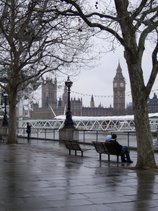What is regarded acceptable or unacceptable language is continually changing, even more so over the last 60 years. Which incidentally is how long this Grumpy Old Fart has been experiencing the joys of life. In Great Britain, as in most countries: print, radio and films were strictly censured. Then along came television.
Regular TV broadcasting started in 1936, but before it could get into its stride along came World War 2. How things have changed, now war is daily brought into our living rooms in all its gory details. But in 1939 the BBC closed down its television service. Television broadcasting started again after the war, in 1946 in the USA. But in those early days it was still the media for the rich. It was not until the early 1950s’ with the start of mass production of TV sets that it became affordable for the masses.
There we sat in front of our 9inch black and white sets. You could buy a magnifying glass to place in front of the screen; it didn’t enlarge the picture but it did effectively distort the image. Oh what exciting days those were - with broadcasts starting at 7p.m.It was thought it would have been too disruptive to broadcast earlier. All broadcasts were live, coming from two studios, the scenery had to be changed between shows. To avoid a blank screen interludes were shown. The image of two films is scared onto my memory. A horse drawn plough endlessly ploughing a field, the other was a potter making a pot - the clay thrown onto the wheel his fingers forming the wet squelche clay. If complicated scenery had to be set-up, the potter’s film was repeated and repeated and repeated. And there we sat, in bored brain-dead expectation “surely the show will start soon”. They had the technology to show films, so why didn’t they schedule short films between shows? They didn’t have to. With only one TV channel we were a captive audience, until ITV burst on the scene in 1955.
Fifty years ago and censorship was strictly applied. Programs were introduced by black-tied dinner jacketed plumb mouthed upper middle class sounding continuity announcers. The women announcers looked as if they were clutching the cheeks of their arse together to prevent a fart escaping. The slightest hint of sex, blasphemy or the mildest of obscenities and the pages of next days newspapers would be screaming outrage. And then there was self-appointed God’s moral guardian on Earth, Mary Whitehouse with her “Clean Up TV” campaigns.
But there was one thing, that now we think totally unacceptable, was in those days common fare on TV - racism. In the 50s’ and 60s’ the Great was vanishing from Great Britain, with the progressive loss of its Empire. “How can those stupid blacks in Africa govern themselves? You must be joking”. Meanwhile back in the UK more and more immigrants were coming from, what was euphemistically called the New Commonwealth, i.e. they were black. The white populace felt threatened. They had to somehow retaliate and so it became perfectly acceptable to make racist jokes. Situation comedy series had to have a black or Indian character who was the butt for the jokes. Inevitably they were servile and not to bright. From the mid 60’s to the 70s’, “Till Death Us Do Part” was the most popular TV comedy. Each week the foul mouthed cockney racist misogynist Alf Garnett ranted his anti-black male chauvinist diatribes, while his lazy layabout scouse son-in-law (played by Anthony Booth). egged him on. Booth? Yes father of Cherie Booth wife of Tony Blair our great and saintly Prime Minister.
By the 1970s Mary Whitehouse had lost the battle for British morals. The end started in 1959 with the passing of the The Obscene Publications Act which allowed publishers to escape conviction if they could show that the work was of literary merit. A year later Penguin tested the law when it published D.H. Lawrence’s Lady Chatterley’s Lover, containing not only steamy descriptions of love acts, but shock horror the f#ck and c#nt words - am I a prude or not, using # instead of “u”. Penquin won the case and the floodgates were opened allowing the bookshelves to be filled with profanities.
By the start of the twenty-first century obscenity was as common an occurrence in print and television as it was on the street. Newspapers are the only media, which in the main, have remained a four letter word free zone, except when it is germane to the story being reported.
Finally we come to the newest form of communication, blogs - which with the exception of China and Korea is censorship free. The language used reflects the code of conduct of the blogger. This ranges from the libertarian to the prudish. I hear one of the most popular blogs is posted by a young lady providing detailed accounts of her sexual exploits.
As for me, my blogs do contain f#ck but never a c***- I’m not a prude, more a little boy giggling at seeing a dirty word in print.
















No comments:
Post a Comment